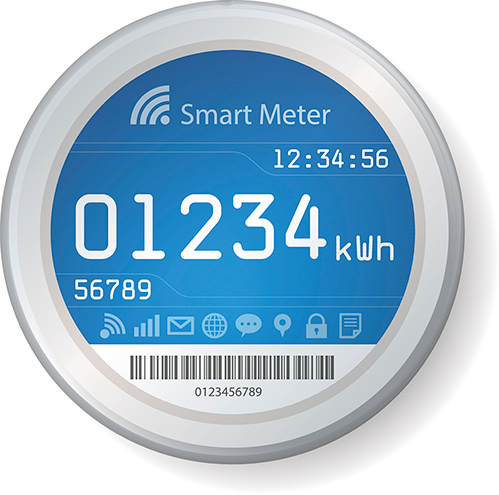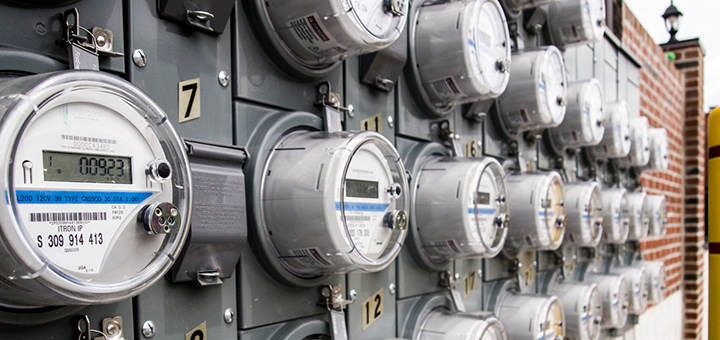Smart meters might seem like a fairly recent technology, but these devices have actually been around since the early 1970’s.
Simply put, a smart meter is a device that tracks consumer energy usage in real-time. What this means is that electricity consumption for a home or business is tracked at every moment during the day, seven days a week, 365 days a year.
Traditional meters do not track usage in this way. They can only track the total consumption amount, which makes it impossible to know how much energy was used during a particular time, or on a particular day. In turn, this can put a strain on the grid because consumers can’t get a good understanding of peak times, or increases in demand.
Pros and Cons of Smart Meters
Like many other technologies, there are both pros and cons that come with installing a smart meter in a home or business.
Pros:
In general, smart meters are a bit more advanced than their traditional meter counterparts. The fact that they can read data quickly and correctly based on time of day, day of week, etc. really helps utilities and electricity providers expand on the kinds of plans and services they can offer.
Some of the major pros to installing a smart meter include:
- Power outage notification (if you’re offsite)
- Power quality monitoring
- Real-time or near real-time sensors
- Consumers gain more control over electricity costs
- Better control over available power resources across the state and country
- Real-time monitoring of the grid (or electricity system) as a whole
- Reducing manual labor to determine meter readings
Cons:
The cons related to installing a smart meter for either the home or business in the United States include:
- Introduction of change and new processes
- Managing new data collection and reading processes
- Ensuring the safety, privacy and protection of collected data
- Trying to convince customers to switch to a new product
- Additional fees
Usage Stats of Smart Meters
In December 2016, the United States Energy Information Administration (EIA) updated their site to include information on smart meter installations. This information revealed the fact that across the United States in 2015, there were approximately 64.7 million smart meters installed. Other information or details about smart meters in America include:
- Number of residential installations in 2015 = 57,107,785
- Commercial smart meter installations in the U.S. in 2015 = 7,324,345
- Total number of smart meter installations for industrial consumers in 2015 = 310,889
According to an IEI Report published in October of 2016 by the Edison Foundation, the United States is approaching 70 million smart meter installations. Based on these numbers, the report suggests that installations will reach 90 million by 2020.
Other facts from this report include:
- Smart meters offer a way to better connect the consumer and electric companies. It is through this relationship of shared data that electric companies can see and meet the needs of their consumers. New services can be created that focus on: budget billing, high usage, web services, load control and more.
- Over 30 electricity companies offer smart meter and related services. Many other companies will soon join them.
- Electricity companies are projected to have spent $32 billion on distribution related needs in 2016.
Smart Meter Installation
 Despite how some people might feel about installing smart meters in homes or businesses, there are some regions where upgrading isn’t a choice. Let’s take a look at some of these states now and the reason’s why they have moved in such a direction. Please keep in mind, there are many other states that aren’t included here that support the switch to smart meter technology. The purpose of this list is to provide you with a small sample of what is happening with smart meters within the United States.
Despite how some people might feel about installing smart meters in homes or businesses, there are some regions where upgrading isn’t a choice. Let’s take a look at some of these states now and the reason’s why they have moved in such a direction. Please keep in mind, there are many other states that aren’t included here that support the switch to smart meter technology. The purpose of this list is to provide you with a small sample of what is happening with smart meters within the United States.
Pennsylvania
In Pennsylvania, law requires having a smart meter installed in your home or business. The state’s, Act 129 was approved in 2008. This Act helps to ensure that the 7 largest electric distribution companies enforce the consumer use of smart meters in order to reduce energy consumption. This Act is regulated by the Public Utilities Commission of Pennsylvania (PUCPA). By 2023, PUCPA hopes to see smart meters installed for all electricity customers.
The electric distribution companies included under this law includes:
- PECO Energy
- West Penn Power
- Duquesne Light
- Met-Ed
- Penn Power
- Penelec
- PPL Electric Utilities
Currently the state charges a fee on all smart meters bills. This small surcharge amount helps to support the implementation of smart meters for all consumers across the state. The rate is determined by the PUCPA and fluctuates year to year. The surcharge fee is expected to drop once the project is completed in 2023. It is not possible to opt out of this fee, as the Act does not allow consumers to opt out of this project.
Texas
Smart meter implementation programs work a little bit differently in Texas. While the Public Utility Commission of Texas (PUCT) is responsible for managing smart meters, it is not required by law to install a smart meter on homes or businesses. Switching over to a smart meter is something that the consumer can decide for themselves. However, the state is very encouraging of consumers that want to make the switch to a smart meter, with many utilities offering related services including,
- Texas-New Mexico Power Company
- CenterPoint Energy
- AEP Texas Central
- Oncor
- AEP Texas North
To participate in the smart meter program in Texas, consumers need to register or sign-up at Smart Meter Texas. This is an online registration (managed by PUCT) which helps consumers to see their usage and other details of their smart meter account. In addition, the site is also responsible for keeping that meter data secure and private.
Ohio
On February 1, 2017, Ohio utility AEP announced that 900,000 consumers across Columbus would receive smart meters. Prior to this announcement, the utility had installed 132, 000 smart meter units as part of a pilot project. This project was extremely successful, and the additional smart meter installations to come help to serve as proof.
These additional smart meters are expected to save AEP approximately $200 million over the next fifteen years. Customers who receive these smart meters will also save electricity over time. However, these customers must also pay a fee to install the smart meter, a point that currently is up for debate amongst regulators.
Illinois
There are two utilities in Illinois that offer smart meter options to consumers. These utilities include,
- ComEd
- Ameren
The state itself has plans to roll out smart meters to all consumers under the umbrella of the above mentioned utilities. For Ameren alone, this means approximately 1.2 million customers by 2019. The majority of consumers who have received a smart meter so far seem to be happy with the savings it provides. To help, the state also provides more information via the Smart Power Illinois website. For consumers curious to know when they will receive a smart meter, they can look that information up based on the city in which they live and utility that provides them service. For example, consumers under ConEd living in Chicago can expect to receive a smart meter by 2017.
New York
Con Edison is a utility that provides services to the state of New York. This year, the utility plans to install close to 5 million smart meters. This change or upgrade aims to help customers make better energy decisions in order to reduce consumption and increase savings. The benefits to getting a smart meter in New York includes:
- Better cost management
- Notifications of power outages for faster restoration services
- No waiting for activation, transfer, or readings
- Easily integrates with solar systems and energy
Should a customer decide to opt out of the smart meter program, they will be charged a fee before or after the meter is installed. Customers with smart meters will be charged a small meter reading charge per month.
Benefits of Smart Meters
Ultimately, smart meters provide consumers with better insight into their electricity consumption habits and make them better energy consumers. Based on the information the smart meter provides, the consumer can then investigate alternate electricity provider plans, energy efficient appliances, and technologies for their home or business.


